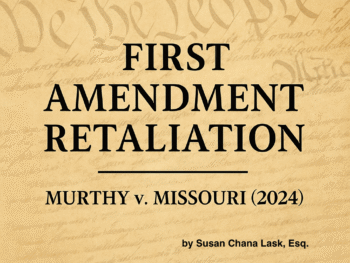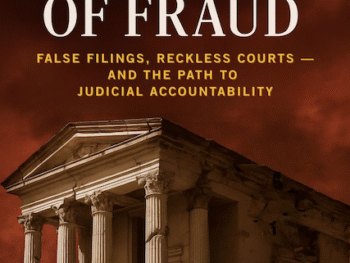On a reconsideration motion in New York Family Court, Susan Chana Lask won an order vacating $25,000 in sanctions imposed on her new client because of his former lawyer’s misconduct.
Sanctions Must Be Supported by Both Proper Bills and a Court Analysis
New York’s sanctions law, NYCRR § 130-1.1 Costs; sanctions, states a court may impose “costs in the form of reimbursement for actual expenses reasonably incurred and reasonable attorney’s fees, resulting from frivolous conduct as defined in this Part (emphasis added).”
The key is “actual” and “reasonable” must be proven by the claimant for sanctions. “[T]he burden of showing the ‘reasonableness’ of the fee lies upon the claimant.” Matter of Karp [Cooper], 145 AD2d 208, 216, 537 NYS2d 510 [1st Dept 1989]. “[T]he [trial] court . . . has the authority and responsibility to determine that the claim for fees is reasonable.” Solow Mgt. Corp. v Tanger, 19 AD3d 225, 226, 797 NYS2d 456 [1st Dept 2005].
The court must consider seven factors to determine reasonableness of the fee demanded:
- complexity of the matter;
- time and labor required;
- attorney’s experience and reputation;
- amount in controversy;
- normally charged attorney’s fees for similar work;
- results of the attorney’s actions; and
- attorney’s responsibility.
Diaz v. Audi of America, Inc., 57 A.D.3d 828, 830, 873 N.Y.S.2d 308, 311 [2d Dep’t 2008).
The court is duty-bound to analyze the bills and the lawyer seeking the sanction amount has the burden of proving those bills. EVUNP Holdings LLC v Frydman, 154 AD3d 558, 559, 62 N.Y.S.3d 263 [1st Dept 2017]. In Evunp, supra, the appellate court vacated a fee award because the lower court failed to analyze bills that were rife with redactions and block billing, and found the lower court could not possibly determine a reasonable fee under those circumstances. Also, a sworn affirmation by the attorney filing for sanctions based on their billing must be filed listing facts supporting the above seven factors.
In Lask’s case, the attorney failed to file an affirmation and the bills had so many redactions and block-billing making it impossible for any court to determine what fees were directly related to services caused by the alleged sanctionable conduct. Thus, Lask proved the Family Court could have never analyzed the bills. Notably, they did not even amount to $25,000 in fees to support a $25,000 sanction. In other words, the court failed its duties.
Reasonable Charges Exclude Secretarial Fees, Block-Billing and Motion Fees
A court may reduce fees that are excessive and reduce fees where the amount requested lacks proof. Solow Management Corp. v Tanger, 43 AD3d 691, 841 N.Y.S.2d 532 [1st Dept 2007]; Josefsson v Keller, 141 AD2d 700, 530 N.Y.S.2d 10 [1st Dept 1988]. Lask proved the $25,000 sanctions order should be reduced to zero because the bills submitted had duplicate charges, charged to draft the sanctions motion and other excessive charges and redactions prohibited by law.
First, duplicate fees are prohibited. When evaluating the reasonableness of attorneys’ fees, the court must “reduce the amount requested to eliminate work that was duplicative or was unnecessarily performed by an attorney, rather than a secretary or paralegal.” JK Two LLC v Garber, 171 AD3d 496, 496, 98 N.Y.S.3d 37 [1st Dept 2019]; S.T.A. Parking Corp. v Lancer Ins. Co., 128 AD3d 479, 480, 9 N.Y.S.3d 250 [1st Dept 2015).
Next, demanding “fees on fees” for drafting the motion and attending the fee motion is prohibited. “It has been established that an award of fees on fees must be based on a statute or on an agreement…” Sage Realty Corp. v Proskauer Rose LLP, 288 AD2d 14, 732 N.Y.S.2d 162 (1st Dept 2001);Gottlieb v. Gottlieb, 30 N.Y.S.3d 65 (1st Dept 2016).
Block-billing is also prohibited. Block billing is the practice of lumping multiple charges together in a single billing entry. Matter of Silverstein v Goodman, 113 AD3d 539, 540, 979 N.Y.S.2d 308 [1st Dept 2014]; RMP Capital Corp. v Victory Jet, LLC, 139 AD3d 836, 840, 32 N.Y.S.3d 231 [2d Dept 2016] [25% reduction of fee award “due to the use of block billing, including vague and nonspecific billing entries, and the nature of th[e] lawsuit”]. Courts reduce fees when the use of block billing “makes it exceedingly difficult for the court to identify whether the amount of time spent on a particular task is reasonable.” 546-552 W. 146th St. LLC v Arfa, 99 AD3d 117, 123, 950 N.Y.S.2d 24 (1st Dept 2012).
The court must also “reduce the amount requested to eliminate work that was duplicative or was unnecessarily performed by an attorney, rather than a secretary or paralegal.” JK Two LLC v Garber, 171 AD3d 496, 496, 98 N.Y.S.3d 37 [1st Dept 2019]; S.T.A. Parking Corp. v Lancer Ins. Co., 128 AD3d 479, 480, 9 N.Y.S.3d 250 [1st Dept 2015]. This means lawyers should not charge for secretarial services such as filing a document in court, faxing a document or organzing a file.
Lask Proved the Family Court Fictionalized a Sanction
Lask proved that an NYCRR § 130-1.1 sanctions award can not be left to the imagination of the Court, and the court can not accept a fictional amount by a lawyer without proof supporting that amount. The sanctions order was vacated and Lask’s new client got the justice he deserved, and was extremely happy.











 Beware of the Latest Lawyer Billing Scheme for Unearned Fees
Beware of the Latest Lawyer Billing Scheme for Unearned Fees